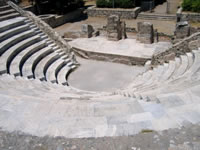How to Write a Play
 Many books on how to write a play can be found in book stores, especially internet sources.
Books such as Roger Hall’s Writing Your First Play, Linda Seger’s Making a Good Script Great, and Jeffrey Hatcher’s The Art and Craft of Playwriting will get you off to a good start.
If you are a student, however, who wants to write a short play in a short amount of time, but you want to do it admirably, I have a few tips for you.
Many books on how to write a play can be found in book stores, especially internet sources.
Books such as Roger Hall’s Writing Your First Play, Linda Seger’s Making a Good Script Great, and Jeffrey Hatcher’s The Art and Craft of Playwriting will get you off to a good start.
If you are a student, however, who wants to write a short play in a short amount of time, but you want to do it admirably, I have a few tips for you.
- Writing a play is like writing a good story with dialogue and action but without narration, so the focus must always remain on how the dialogue can communicate effectively with supporting action on stage.
- A good story has an effective plot with tension that will move it along adequately, and it has well defined, interesting characters who can provide the tension.
- You can create your own plot by putting a new spin on your favorite master plot, or you can take an already published story and turn it into a script. Maybe your assignment was to do just that.
- Once you have your plot and characters, put them in a setting that will be possible to manipulate on the stage. This does not mean you can’t be imaginative. A most wonderful quality of theatre is the playwright’s license to ask the audience to imagine being on a lake, on a bus or train, or in a cave. The set only suggests the location; it does not need to interpret it literally.
- Divide the story into scenes, if not acts, and plan the passage of time so that if a day or a week passes between scenes, the audience will recognize that fact easily.
- Think of a good opening scene and start there. The audience will need to have very little background information if the characters are well developed.
- Once you begin the dialogue, choose words carefully and pare down what is unnecessary. Small talk is okay if that’s what you want to communicate about your character. Otherwise, talking about the weather may not move the plot forward.
- Dialogue allows the audience to know the characters and communicate the tension that is going to fuel the conflict. It goes without saying that a play without conflict will fall flat on its face. Always remember the importance of the conflict with every word you write, and make the characters’ words and actions support it.
- Stage directions, usually written in parentheses or italics, are essential if you want the actors to know when and where to move.
- The conflict must be resolved in some way at the end of the play, even if it is not a satisfactory solution for the characters. It is the audience that must feel satisfied at the end of the last scene.
- If you are using a published story for a class assignment, choose the scene or scenes that interest you or are suggested by your teacher and lift out as much of the dialogue from the story as you need without the narration. This borrowing from the book will keep you as close to the text and the author’s purpose as possible.
- Shakespeare’s rhetorical device of bantering has never gone out of style. A line for line exchange in which characters retort short lines back and forth can still be as clever and witty and exciting to watch as it was in the sixteenth and seventeenth centuries.
- Consider costumes, simple stage settings, sound effects, and music to enhance the final production of your show.
 If you are considering writing a one-, two-, or three-act play as a beginning professional, read everything you can get your hands on about plot,
characterization, and the genre itself.
Although similar, screenwriting has some unique differences from playwriting, and many good books by successful screenwriters are available.
If you are considering writing a one-, two-, or three-act play as a beginning professional, read everything you can get your hands on about plot,
characterization, and the genre itself.
Although similar, screenwriting has some unique differences from playwriting, and many good books by successful screenwriters are available.
